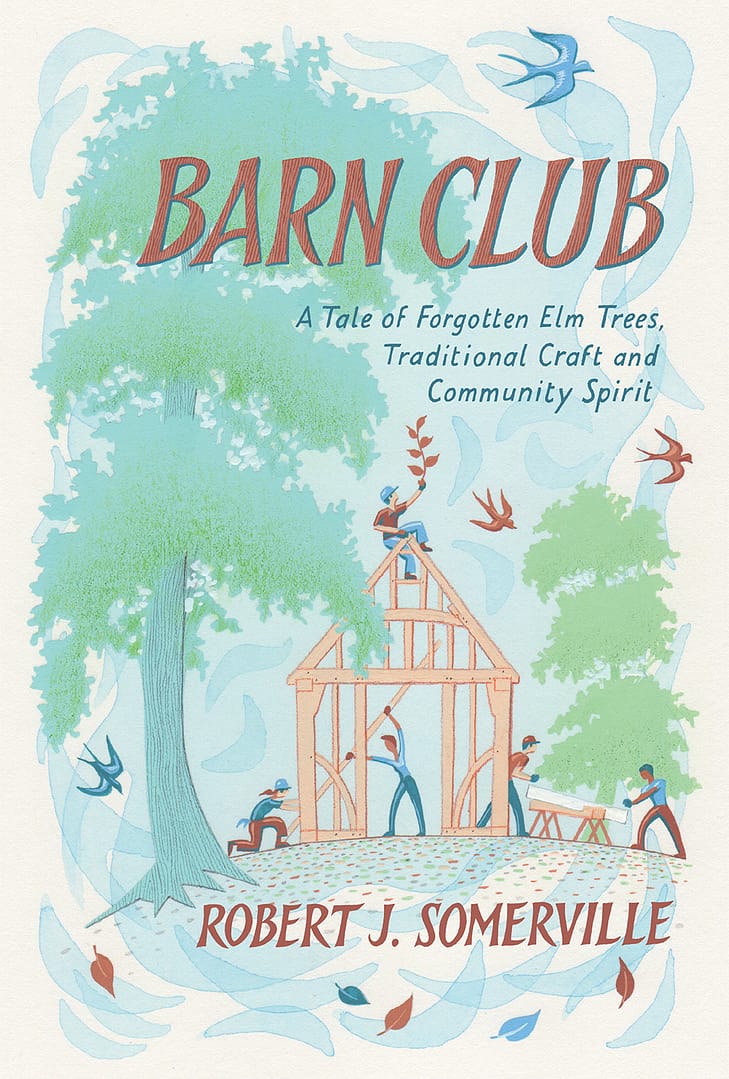EXCERPTS
| Pages: | 272 pages |
| Book Art: | Black-and-white illustrations throughout, 16-page color insert |
| Size: | 6 x 9 inch |
| Publisher: | Chelsea Green Publishing UK |
| Pub. Date: | March 17, 2021 |
| ISBN: | 9781603589666 |
Also available in:
Barn Club
A Tale of Forgotten Elm Trees, Traditional Craft and Community Spirit
Hardcover
$25.00
“In today’s ego-techno-centred world, Robert Somerville’s . . . Barn Club approach is a way forward that utilizes local traditions, local materials, and local hands to create a built environment that is more harmonious with the natural world and of course more beautiful.”—Jack A. Sobon, architect, timber framer, and author of Hand Hewn
“Somerville knows more about wooden barn construction than almost anyone alive.”—The Telegraph
Natural history meets traditional hand craft in this celebration of the elm tree and community spirit.
When renowned craftsman Robert Somerville moved to Hertfordshire in southern England, he discovered an unexpected landscape rich with wildlife and elm trees. Nestled within London’s commuter belt, this wooded farmland inspired Somerville, a lifelong woodworker, to revive the ancient tradition of hand-raising barns.
Barn Club follows the building of Carley Barn over the course of one year. Volunteers from all walks of life joined Barn Club, inspired to learn this ancient skill of building elm barns by hand, at its own quiet pace and in the company of others, while using timber from the local woods.
The tale of the elm tree in its landscape is central to Barn Club. Its natural history, historic importance, and remarkable survival make for a fascinating story.
This is a tale of forgotten trees, a local landscape, and an ancient craft.
This book includes sixteen pages of color photographs, and black and white line drawings of techniques and traditional timber frame barns feature throughout.
Perfect for fans of Norwegian Wood and The Hidden Life of Trees.
Reviews and Praise
Booklist–
"The opening chapters read like a prose poem; Somerville's love for nature and natural things is infectious."
More Reviews and Praise
"A joyful reminder of why nature, being outside, being together and creating beauty is so good for the soul."—Kate Humble, broadcaster and author of A Year of Living Simply
"For the reader who wishes to resist the gathering pace of modern life and take time to learn from the past, the tale of hand-raising a barn the old-fashioned way brings nature, community and craftsmanship together in an enduring and satisfying feeling of a job well done."—Gillian Burke, co-presenter of BBC’s Springwatch, writer and biologist
‘For all our advances, it’s hard to deny the modern world brings with it new ills of disconnection and disenfranchisement, but here in Barn Club they’ve found their cure. The emphasis on hand-tool workmanship places value on what an individual can achieve without the use of machines and smartphones; the size of the project necessarily brings people to work together. A common goal that requires purposeful physical work whilst being able to talk without shouting over loud machinery or just being able to tune into the flow of work and the soothing sounds of the rhythmic tools. Could this book sow the seeds of community barns springing up all over our fair land? A space for communal well-being, an opportunity for everyone, not just the privileged, to connect with the nurturing nature of trees and craft?’
—Barn the Spoon, master craftsman and author of Spōn
"In today’s ego-techno-centred world, Robert Somerville’s tale of elm trees, hand tools, timber framing and comradery is a welcome relief. His “Barn Club” approach is a way forward that utilises local traditions, local materials and local hands to create a built environment that is more harmonious with the natural world and of course more beautiful. Now, if every community around the world had one of these Barn Clubs, how nice would that be?"—Jack A. Sobon, architect, timber framer and author of Hand Hewn
"Elm trees may have been devastated by Dutch elm disease but they are still with us and should not be forgotten, as Robert Somerville powerfully shows. Natural history, ancient crafts and a group of twenty-first-century volunteers meet in this book to show us how elms can reconnect us to nature, past cultures and one another. A beautiful and timely book with a barnful of good ideas."—Professor Richard Buggs, Royal Botanic Gardens, Kew
"Robert Somerville is to be congratulated for his understanding of the entomology and pathology involved in Dutch elm disease, which in addition to its devastation of British elms also resulted in the loss of over 300 million American elms. His book should find a ready readership among do-it-yourselfers, whose home improvement projects have multiplied in this Covid environment."—John Hansel, founder, Elm Research Institute







